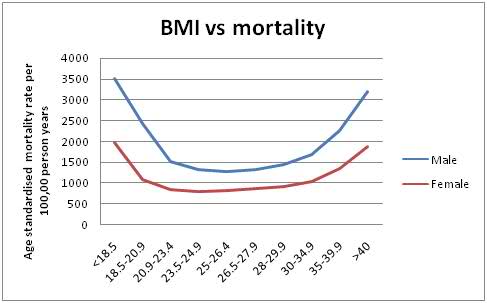The science behind that is actually fairly simple...
The aspect of your body chemistry that decides what to do with fat is dictated by insulin production...the higher the glycemic index of the food (meaning, how much it makes your insulin spike) dictates how much your body is going to store fat in the cells.
So if you're eating low carb, you can eat high fat because your body isn't trying to store it, ...and the inverse, if you're eating high carb, it's telling your body to store fat, so you can't be taking as much of it in.
The downsides of the high carb/low fat route (as I see them) are as follows:
1) There are other processes in your body that are fat-dependent (Hair, nails, brain, etc... all rely on fat), and you run the risk of depriving those other processes
2) Taste of the diet (for me at least), if you're someone like me who likes to eat larger portions, bud doesn't necessarily mind giving up the starches and sugars, then the low carb route is going to seem more tolerable. This one may be more of a personal preference thing for people as they find which scenario is more tolerable, giving up starch & sugar might make some people miserable...portion control might make others more miserable. (I would be in the latter)
I can sympathize. I wish weight loss and achieving good health was a simple item to figure out. The rice diet of all carbs resulting in weight loss is an awkward diet for the low carb community. I've seen some try to explain why the rice diet results in weight loss, despite the high insulin levels that would result from the diet, but haven't seen anything that convinces me. Personally I suspect wheat gluten, but that is my personally belief.
As for good health, that is an individual thing I suppose. The creator of the diet, Dr. Kempner for example lived to the ripe old age of 94. He was in good health toward the end reportedly.
Let me show you a sight. This is Dr. Stephen Guyenet's blog. He is an obesity researcher. He has been vilified by some in the low carb community for saying weight loss and good health is not as simple as the insulin theory. As Dr. Guyenet often mentions, he doesn't believe that sugar consumption is healthy, but equally its intake often does not answer why weight gain happens or why poor health can come about. He is often posting awkward diet instances where high carb diets were eaten and yet weight loss occurred and health improved. He has a funny post about a guy that lived off of potatoes and olive oil for a month and looked great when all done.
http://wholehealthsource.blogspot.com
I think politically we will see more and more efforts to tax sugar. You see that in the UK. Some low carb sights are openly lobbing for the sugar tax. (I don't know if it has happened in the UK or not yet.) Some low carb sights are upset over the idea of a sugar tax.
In America just yesterday I read in the city of Philadelphia is to tax soda. I hope it results in greater improved health. Personally I have doubts it will. As the mayor mentioned more tax funds are needed and taxing sugars is a way to go about it. Some of the low carb community are concerned fats will eventually be taxed. Fat is still vilified at times. I would guess more "bad" food taxes are to come.
The Soda Tax Craze Hits Philadelphia
http://fortune.com/2016/05/20/the-soda-tax-craze-hits-philadelphia/
And I don't know if you saw it, but apparently it has been in the news quite a bit. Apparently some feel being overweight leads to a longer and healthier life for most. I've seen the arguments against this. They seem more convincing to me. A nice rebuttal can be read on Dr. Guyenet's sight.
"The healthiest weight might actually be 'overweight', massive study finds"
http://www.sciencealert.com/the-healthiest-weight-might-actually-be-overweight-massive-study-finds
Upvote
0


